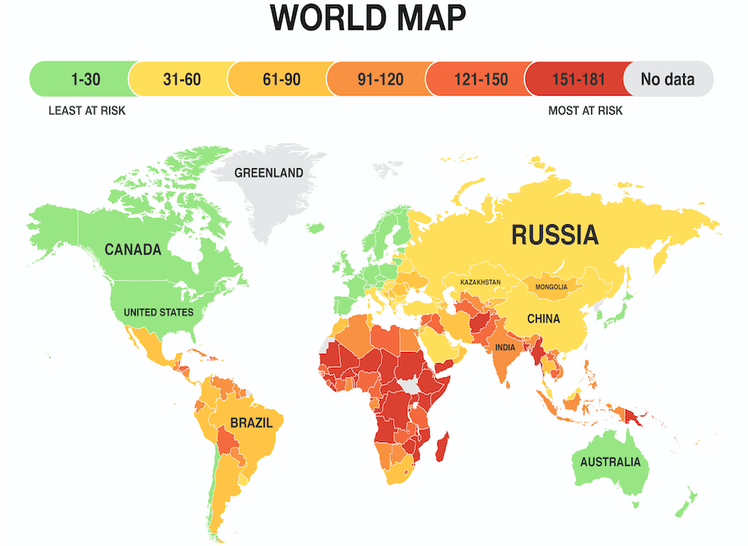
Trump & the Paris Accord: Can developing countries survive?
by Aidan Hunt
The Developing Countries are not responsible for global warming but can expect to suffer most of the damages. Developed Countries must accept their historic responsibility for causing climate change and admit that they have a moral responsibility to reduce emissions significantly, Donald Trump has rejected this moral responsibility by announcing that the United States will withdraw from the 2015 Paris Climate Accord.
The climate system may be global in context, but its manifestations are regional or local in their occurrence, character and implications. The effects of temperature increases will not be uniformly distributed across the globe and research suggests that “…poorer countries are likely to suffer the bulk of the damages.” [1]. In June 2017, US President Donald Trump announced that the United States would withdraw from the 2015 Paris Climate Accord, a relatively modest agreement to limit the increase in global temperatures to below two degrees celsius, stating that “…the Paris Accord will undermine our economy… and put us at a permanent disadvantage.” The United States is abdicating its responsibility, as the second-largest contributor of emissions, to reduce emissions and prevent environmental degradation in poorer countries.
The increases in global average temperatures, sea-level and annual precipitation, as well as increases in the intensity and frequency of floods, droughts, storms, heatwaves and epidemics, are believed to be caused by human activity and, in particular, increasing greenhouse gas emissions. The Intergovernmental Panel on Climate Change states that global carbon dioxide emissions have increased by almost fifty per cent in the last three decades and “…oceans have warmed, the amounts of snow and ice have diminished, and sea level has risen.” [2].
The adverse consequences of increases in global average temperature are likely to be concentrated in Developing Countries as many of these already have naturally warmer climates. Increases in temperatures will cause droughts and reduce annual precipitation, reducing agricultural yields and threatening food security for impoverished populations and those in tropical regions, Africa may struggle to provide sufficient food for domestic consumption. The increasing number of droughts and reduced precipitation mean water is likely to become scarce, especially in areas that are already water-stressed, including Sub-Saharan Africa and the Mediterranean. The increased frequency and severity of natural disasters will reduce government revenues and vast sums will be needed for reconstruction which may not be available in Developing Countries.
Who is responsible for environmental degradation? The atmospheric concentration of carbon dioxide has been rising extensively since the Industrial Revolution began in Britain, spreading to the United States and Europe in the Nineteenth Century. The United Nations recognises the historic responsibility of the Developed Countries in causing global warming and it is argued that this should prompt these countries to take the lead in reducing greenhouse gas emissions. The Developed Countries have a responsibility to make significant and absolute reductions in their emissions in order to create a larger carbon space which can accommodate the development needs of Developing Countries.
The International Monetary Fund states that “…advanced and emerging market economies have contributed the lion’s share to actual and projected warming… helping low-income countries cope with its consequences is both a moral duty and sound global economic policy.” Former US President Barack Obama may have acknowledged this duty when he announced that the United States would contribute $3 Billion USD to an international fund intended to help Developing Countries address the effects of global warming. The United States under President Donald Trump is evading its responsibilities by withdrawing from the 2015 Paris Climate Accord, refusing to commit to reducing emissions and refusing to provide adequate financial resources and appropriate technologies to Developing Countries. Climate Interactive predicts that without the involvement of the United States in the Paris Climate Accord, there will be an increase in average temperatures over pre-industrial levels of 3.6°C . With the involvement of the United States, that projected increase is 3.3°C.
It is clear that Developed Countries have a historic responsibility for causing global warming and a moral responsibility to reduce emissions and provide financial assistance to Developing Countries to allow them to fund domestic environmental projects. The United States’ withdrawal from the Paris Climate Accord represents an evasion of this responsibility. Other Developed Countries can also be condemned for avoiding taking meaningful action to mitigate the negative consequences of temperature increases though it is worth mentioning that the United States is now the only country that rejects the Paris Accord. The United States and Europe should take the lead in reducing emissions, especially if they wish to avoid accepting and supporting large numbers of so-called climate refugees.
Offline references
[1] Mendelsohn, R., Dinar, A. & Williams, L. (2006) The Distributional Impact Of Climate Change On Rich And Poor Countries, Environment And Development Economics, Cambridge: Cambridge University Press.
[2] The Intergovernmental Panel on Climate Change (2014) Climate Change 2014: Synthesis Report, Geneva: IPCC.


0 Comments